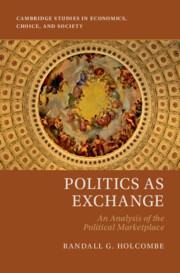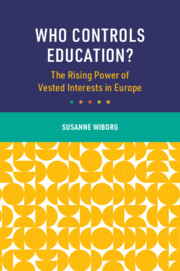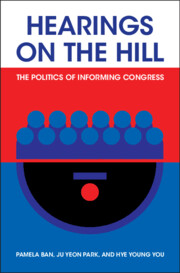Refine search
Actions for selected content:
147 results
8 - Interest Groups
-
- Book:
- Politics as Exchange
- Published online:
- 23 October 2025
- Print publication:
- 06 November 2025, pp 127-143
-
- Chapter
- Export citation
1 - The Political Marketplace
-
- Book:
- Politics as Exchange
- Published online:
- 23 October 2025
- Print publication:
- 06 November 2025, pp 1-13
-
- Chapter
- Export citation
Lobbying coalitions and their determinants: a systematic literature review
-
- Journal:
- European Political Science Review , First View
- Published online by Cambridge University Press:
- 05 November 2025, pp. 1-17
-
- Article
-
- You have access
- Open access
- HTML
- Export citation

Money, Partisanship and Power in Local Politics
-
- Published online:
- 03 November 2025
- Print publication:
- 31 December 2025
-
- Element
-
- You have access
- HTML
- Export citation

Politics as Exchange
- An Analysis of the Political Marketplace
-
- Published online:
- 23 October 2025
- Print publication:
- 06 November 2025
Transparency matters: The positive effect of politicians’ side income disclosure on voters’ perceptions
-
- Journal:
- European Journal of Political Research ,
- Published online by Cambridge University Press:
- 17 October 2025, pp. 1-18
-
- Article
-
- You have access
- Open access
- HTML
- Export citation
4 - Decarbonization Efforts in NYC
-
- Book:
- Local Greens
- Published online:
- 11 October 2025
- Print publication:
- 18 September 2025, pp 55-71
-
- Chapter
- Export citation
Who Stopped the Equal Rights Amendment?
-
- Journal:
- State Politics & Policy Quarterly / Volume 25 / Issue 4 / December 2025
- Published online by Cambridge University Press:
- 12 September 2025, pp. 439-463
- Print publication:
- December 2025
-
- Article
-
- You have access
- Open access
- HTML
- Export citation
The Influence of Federalist Society Affiliation on Senator Voting in Federal Judicial Nominations
-
- Journal:
- Journal of Law and Courts ,
- Published online by Cambridge University Press:
- 15 August 2025, pp. 1-22
-
- Article
-
- You have access
- Open access
- HTML
- Export citation
Principled Pragmatism: Big Business and Campaign Contributions After January 6
-
- Journal:
- British Journal of Political Science / Volume 55 / 2025
- Published online by Cambridge University Press:
- 01 August 2025, e100
-
- Article
-
- You have access
- Open access
- HTML
- Export citation
Connecting minds and catalyzing collaboration: the interest groups of health technology assessment international
-
- Journal:
- International Journal of Technology Assessment in Health Care / Volume 41 / Issue 1 / 2025
- Published online by Cambridge University Press:
- 07 July 2025, e43
-
- Article
-
- You have access
- Open access
- HTML
- Export citation
What makes a good lobbyist for the government? Explaining intergovernmental lobbying success
-
- Journal:
- European Political Science Review / Volume 17 / Issue 4 / November 2025
- Published online by Cambridge University Press:
- 19 June 2025, pp. 729-745
-
- Article
-
- You have access
- Open access
- HTML
- Export citation
“In Keeping with the Overwhelmingly Pro-Life Sentiment in this State”: Abortion Law and Policy in North Dakota after Roe v. Wade
-
- Journal:
- Journal of Policy History / Volume 37 / Issue 3 / July 2025
- Published online by Cambridge University Press:
- 03 June 2025, pp. 223-248
-
- Article
-
- You have access
- Open access
- HTML
- Export citation
The lesson from America: US politics and recent trends in contemporary political economies
-
- Journal:
- Italian Political Science Review / Rivista Italiana di Scienza Politica / Volume 55 / Issue 2 / July 2025
- Published online by Cambridge University Press:
- 25 April 2025, pp. 200-206
- Print publication:
- July 2025
-
- Article
-
- You have access
- Open access
- HTML
- Export citation
16 - Health Law’s Sheathed Sword
- from Part IV - How Private law Can and Cannot Control Costs
-
-
- Book:
- Health Law as Private Law
- Published online:
- 16 March 2025
- Print publication:
- 27 March 2025, pp 204-216
-
- Chapter
-
- You have access
- Open access
- HTML
- Export citation

Who Controls Education?
- The Rising Power of Vested Interests in Europe
-
- Published online:
- 26 March 2025
- Print publication:
- 03 April 2025
Beyond Group Membership: New Way of Measuring Environmental Interest Group Strength in the American States
-
- Journal:
- State Politics & Policy Quarterly / Volume 25 / Issue 2 / June 2025
- Published online by Cambridge University Press:
- 14 February 2025, pp. 237-259
- Print publication:
- June 2025
-
- Article
- Export citation
Who Does and Who Does Not Engage in Strategic Litigation in European Law?
-
- Journal:
- German Law Journal / Volume 25 / Issue 6 / August 2024
- Published online by Cambridge University Press:
- 24 January 2025, pp. 856-872
-
- Article
-
- You have access
- Open access
- HTML
- Export citation
Neoliberal reforms, Great Recession and political backlash: parties, groups and voters in the new politics of welfare in Italy
-
- Journal:
- Italian Political Science Review / Rivista Italiana di Scienza Politica / Volume 55 / Issue 2 / July 2025
- Published online by Cambridge University Press:
- 21 January 2025, pp. 171-185
- Print publication:
- July 2025
-
- Article
-
- You have access
- Open access
- HTML
- Export citation

Hearings on the Hill
- The Politics of Informing Congress
-
- Published online:
- 21 November 2024
- Print publication:
- 28 November 2024

